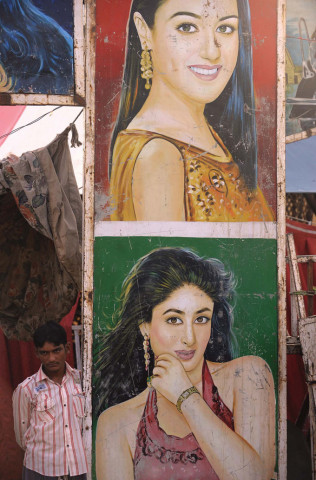Special needs: Oasis for autistic children
Autistic children are usually rejected by schools which cannot give them the tailored attention they need.

Riyan liked listening to and copying birds. He would sit in the front garden chirping for hours. The five-year-old would also repeat all the words he heard, again and again and again.
It was all too much noise for the owner of the house his parents were renting, and Riyan and his family had to move out. There was a similar problem at school. Most schools in Pakistan are unable to handle autistic children and will usually ask them to leave.
But after close to a year at Oasis, Riyan is now a more patient, disciplined and settled child, say his parents. “That’s why we’re named Oasis, because we’re the only school for autistic children in Pakistan,” says Samrina, the principal and co-founder of the school.
Autistic children are often repulsed by strangers and have difficulty expressing themselves. Many have speech disorders. They require special care and individual attention from their teachers.
Ayesha Haroon had the resources to admit her seven-year-old son to a school for special children in London. But she wanted her kids to grow up in Pakistan in a joint family system, like she had in Lahore. So she returned and decided to set up a school for autistic children in Raiwind. She brought back a speech therapist that specialised in communicating with autistic children and enlisted Samrina, an experienced teacher, as her partner.
Samrina arranged workshops on how to communicate with autistic children and brought in trainers from Ireland and England. The school started off small in 2009, but interest grew. When the school building in Raiwind became functional in April 2010, there were four students and six teachers. Today there are nine children and 13 teachers; several of them have their own kids enrolled in Oasis.
Parenting and teaching
Ayesha Lodhi says she first noticed something wrong with her son when he was aged two and stood in front of the television. “I asked him to move and he did not react,” she says. “We thought it was a hearing problem but the tests showed otherwise. He was diagnosed with autism at age four.” Lodhi tried several schools, but each time, after a little while, the school would ask her to withdraw him. In September 2010, Lodhi found out about Oasis. Her son, now aged seven, is doing much better.
Lodhi herself teaches 11-year-old Adam*, who has Asperger’s syndrome. Over the last 18 months, Adam has learnt to speak and is now studying the fourth grade syllabus of a regular school. “He also likes interacting with non-autistic children and enjoys reading,” Lodhi says.
The parents of two non-verbal students said that their sons spoke initially but soon started forgetting the words they were taught. By the age of four, they were not speaking at all.
Of the nine students, only two are verbal. Two are echolaliac, meaning they can only repeat words they hear. These children are subjected to intense speech therapy. A nine-year-old girl, having no formal schooling, started as non-verbal. Samrina says that she recently started constructing small sentences.
It’s important to engage autistic children by doing what interests him or her, says Samrina. Every child is different from the other. Some are interested in picture tutorials, others in painting or cooking.
Special classrooms
The building currently accommodates nine students all under the age of 11 but has the capacity for 50. It consists of four classrooms, a library, a dining area and kitchen, a gymnasium, a sensory room, a therapy room, a changing room, a swimming pool and a courtyard.
The dining area is signposted with a picture of food and the bathroom with a picture of a sink. The open courtyard in the middle ventilates the building. Swings and pool equipment in the gymnasium acquaint these children with playing activities just like ‘normal’ kids.
The classrooms are minimally furnished to avoid distracting the students. Autistic children often have refined hearing and visual abilities, making them easily sidetracked.
The classrooms are also personalised for each student. One four-year-old able to relate better to pictures and objects has clay and toys sunk into a tub of sand. As the teacher pronounces the name of the object, the child responds by picking or pointing to the object or a picture.
A highly modified environment is important to personalise the learning experience for each autistic child, Samrina says. And they only get three weeks vacation in the summer, as a longer break can retard their progress, she adds.
With more teachers than students and its highly modified classrooms, the fees at Oasis are pretty high. Samrina says three of their students are sponsored, and she is always looking out for more donors as there are more parents wanting to enrol their kids at Oasis.
“The challenge for us is to make these children independent,” Samrina says. “A positive approach is necessary to bring out positive behaviour in them.”
*The names of children have been changed to protect their privacy.
World Autism Awareness Day
The United Nations declared April 2 World Autism Awareness Day in 2008 to increase and develop world knowledge of autism. Autism is a spectrum of psychological conditions characterised by widespread abnormalities of social interactions and communication, as well as restricted interests and repetitive behaviour. The disorder can become evident in children as young as two. According to Samrina Anwar, principal of the Oasis school for autistic children, public awareness and tolerance of autistic children in Pakistan is very low.
Published in The Express Tribune, April 4th, 2011.



















COMMENTS
Comments are moderated and generally will be posted if they are on-topic and not abusive.
For more information, please see our Comments FAQ